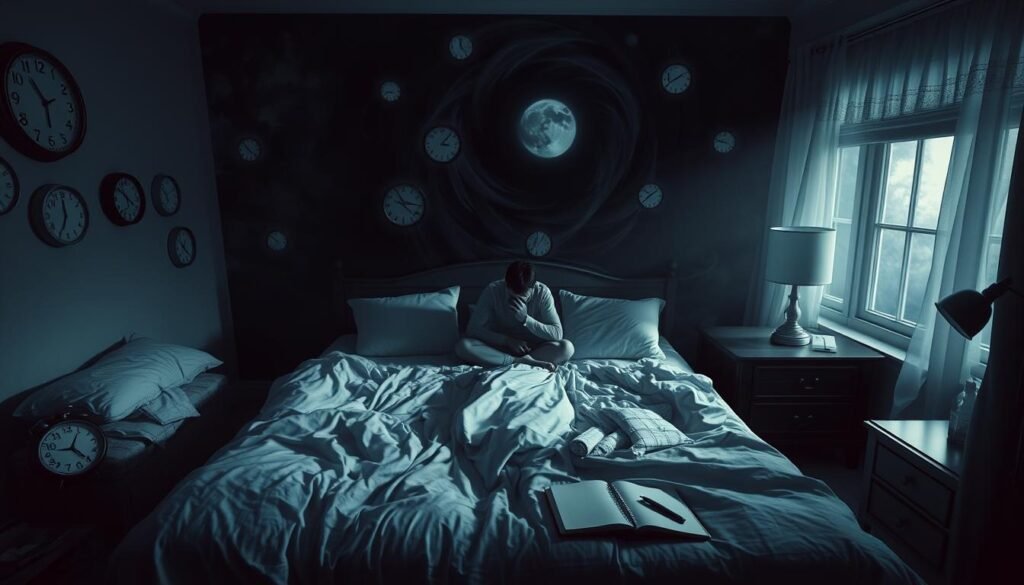Did you know about 30,000 people in the U.S. die by suicide every year? This fact shows we must look into what causes this sad event. Studies have found a scary link between not being able to sleep, feeling very sad, and thinking about suicide. Insomnia means you can’t fall asleep or stay asleep. It’s a big problem that can lead to feeling depressed or even suicidal. It has been found that bad sleep can make the risk of suicide go up by 34%. So, it’s important to see how these issues affect each other.
Research points out that insomnia alone can predict the risk of thinking about suicide for people of all ages. This brings up the urgent need for ways to help. Since 2010, more than 20 studies have been published. They show the strong link between insomnia and the risk of suicide. The evidence makes it clear. We need to fight the harmful effects of not sleeping well on our minds and communities.
Key Takeaways
- About 30,000 people die by suicide annually in the U.S.
- Insomnia increases suicide risk by 34% among individuals.
- Frequent nightmares are 105% more likely to lead to suicide.
- Over 20 studies since 2010 link insomnia to suicide.
- Insomnia functions as an independent risk factor for suicidality.
- Proper interventions can address the connection between sleep disturbances and mental health issues.
Understanding Insomnia and Its Symptoms
Insomnia shows up in different ways, hurting our sleep quality and health. It’s important to know the types of insomnia to understand its effects. Each kind brings its own problems, making daily life and mental health harder.
Types of Insomnia
Insomnia falls into three main categories:
- Initial insomnia: Hard to fall asleep at the night’s start.
- Middle insomnia: Hard to stay asleep, with a lot of nighttime awakenings.
- Terminal insomnia: Waking up too early and can’t fall asleep again.
Common Symptoms and Effects
Those with insomnia usually face many insomnia symptoms. These symptoms are:
- Frequent restless nights
- Daytime fatigue
- Irritability
- Hard to concentrate
These symptoms do more than just make you tired. Sleep quality goes down. This makes it tough to get through the day. It also raises the chance of mood problems, like depression.
Connecting Insomnia to Mental Health Issues
It’s crucial to understand how insomnia links to mental health issues for effective treatment. Sleep loss can seriously affect mood control. This leads to a higher risk of depression and anxiety. Insomnia itself can increase the chance of having suicidal thoughts. Knowing this helps us treat people with mental health problems better.
The Role of Sleep Deprivation
Sleep loss severely harms mental health. Those with ongoing sleep problems enter a vicious cycle. Stress makes their insomnia worse, which increases stress further. This cycle can cause more anxiety and sadness. It’s very important to solve sleep issues to maintain mental health. Also, worsening insomnia can lead to major depression. For more on depression and sleep, see this resource.
Insomnia as an Independent Risk Factor
Chronic insomnia is a serious problem. It can cause depression and raise suicide risk on its own. Research shows that older people with poor sleep are more likely to think about suicide. This happens even if they’re not depressed. Young people with bad sleep also have more suicidal thoughts. They feel this way without showing signs of depression. So, it’s key to see insomnia as a big risk. It could lead to more severe mood issues if ignored.
Increased Risk of Depression and Suicide cause of Insomnia
The link between not sleeping well and mental health problems is well-known. Especially, how it affects depression and thoughts of suicide. Many studies have looked into how trouble sleeping can impact mental health. They show worrying connections between not getting enough sleep and feeling depressed or thinking about suicide.
Statistical Insights on Depression
Research has found a strong connection between trouble sleeping and feeling very sad. Since 2010, more than 20 studies have shown that people who can’t sleep well are more likely to think about suicide. Those with insomnia are twice as likely to have such thoughts. For instance, 13.1% of people with insomnia think about suicide. This is much higher than the 2.3% in the wider community. This big difference shows how important it is to help those feeling sad sleep better.
The Link Between Insomnia and Suicidal Ideation
Bad dreams and broken sleep also make the risk of mental health issues worse. Studies show that bad dreams make suicidal thoughts 1.5 to 3 times more likely. They also triple or quadruple the chance of trying suicide. People who can’t sleep well often wake up a lot at night. This pattern is closely linked to thinking more about suicide. Not sleeping can weaken our decision-making skills, especially at night. This can make the risk of suicidal thoughts and actions even higher.
How Insomnia Impacts Mood Disorders
Insomnia is a big issue that affects mood disorders a lot. Through different studies, we see how sleep problems are common in people with mood disorders. The link between insomnia epidemiology and mental health is clear.
Epidemiological Evidence of Insomnia
Around one-third of adults have some insomnia symptoms, and 6-10% have serious insomnia problems. Insomnia increases the risk of suicide, besides mood disorders. This is even more true for those with mental health conditions.
People with anxiety might have a 70% chance of insomnia. For those with bipolar disorder, it’s about 81% during depressive episodes. Schizophrenia patients also face a 50-80% chance of not sleeping well. This shows how deep sleep issues and mental health problems are connected.
Behavioral and Psychological Mechanisms
The way insomnia and mood disorders are linked is complicated. Thinking wrongly about sleep can make anxiety worse. This leads to a cycle where not sleeping well makes depression deeper. Also, feeling more irritable and not thinking clearly because of no sleep ties back to mood disorders.
Nightmares, which are common for people with mood issues, really increase the risk of suicidal thoughts and actions. Sometimes, they are a bigger sign of danger than insomnia itself. It’s important to understand these issues to help those with mood disorders.
The Biological Mechanisms behind Insomnia and Depression
Insomnia and depression are closely connected through biological pathways. These cause trouble in how we function daily. Understanding them helps us see the effect of disturbed sleep cycles, unbalanced neurotransmitters, and insomnia on our mental health.
Circadian Rhythm Disruption
Our body’s internal clock controls our sleep and wakefulness. It can be thrown off by changes in our routine. This disruption leads to unpredictable sleep patterns. These can increase stress and worry. Struggling to keep a regular sleep schedule can harm how we feel emotionally.
Neurotransmitter Imbalances
Imbalances in neurotransmitters matter in the link between insomnia and depression. Key mood-controlling chemicals, serotonin and norepinephrine, get out of balance with insomnia. People with this sleep issue have lower levels of these chemicals. This makes depression symptoms worse. For further details, visit this source.
Hyperarousal and Dysfunctional Beliefs
Hyperarousal insomnia makes it hard to sleep by keeping us overly alert. It often comes from wrong beliefs about sleep. These thoughts cause anxiety and make it hard to rest. Addressing these beliefs could reduce insomnia. This change can boost mood and mental well-being.
| Biological Mechanism | Impact | Connection to Depression |
|---|---|---|
| Circadian Rhythm Disruption | Irregular sleep patterns and increased stress | Heightened risk of anxiety and depressive symptoms |
| Neurotransmitter Imbalances | Reduced serotonin and norepinephrine levels | Increased propensity for mood regulation issues |
| Hyperarousal Insomnia | Heightened alertness and difficulty sleeping | Exacerbation of anxiety and stress-related disorders |
Assessing the Severity of Insomnia
Understanding how bad someone’s insomnia is helps us see its effects on their mind. The Insomnia Severity Index (ISI) is a great tool for this. It looks at insomnia symptoms and how they affect someone’s day-to-day life. Knowing this helps doctors figure out the best way to help.
Insomnia Severity Index (ISI)
The ISI is a key tool for judging how severe insomnia is. It asks questions about sleep quality, how long it takes to fall asleep, and if insomnia makes life harder. Studies show that high ISI scores may link to more serious issues like depression or even thoughts of suicide. Understanding these scores helps doctors create better treatment plans. To learn more about insomnia and mental health, check out this resource.
Structured Clinical Interviews
Structured interviews are another way to measure insomnia’s impact. They let health experts get a full picture of someone’s sleep issues and any related symptoms. This in-depth talk helps link sleep problems with mental health issues like depression. It leads to a better understanding and treatment of sleep problems.

Insomnia Treatment Options
Treating insomnia often means using a mix of methods. Cognitive Behavioral Therapy for Insomnia (CBT-I) is a key non-drug approach. It helps by changing the thoughts and actions that disrupt sleep. Besides CBT-I, some people might need sleep meds. Things like antidepressants and sleep aids offer quick relief. Making changes to daily habits can also lead to better sleep.
Cognitive Behavioral Therapy for Insomnia
Cognitive Behavioral Therapy for Insomnia is the top non-drug treatment. It targets harmful thoughts and actions related to sleep. With CBT-I, you might work on:
- Sleep restriction: Limiting time in bed to improve sleep efficiency.
- Stimulus control: Associating the bed with sleep only, not wakefulness.
- Relaxation techniques: Teaching methods to reduce anxiety and promote relaxation before bedtime.
Medications: Antidepressants and Sleep Aids
Though CBT-I works well for many, some need meds to tackle their insomnia. Antidepressants can help if you’re also feeling depressed. Sleep aids like zolpidem and eszopiclone target sleep issues directly.
Talking with a doctor about these meds is crucial. They can have different effects and side effects on people.
Lifestyle Modifications
Making changes to your lifestyle can boost the success of treating insomnia. Key steps include:
- Having a regular sleep schedule to sync your body’s clock.
- Starting a calming bedtime routine to get your body ready for sleep.
- Improving sleep hygiene by limiting screens before bed and making your sleep space comfy.
These steps can lessen insomnia symptoms and enhance your mental health.
| Treatment Options | Benefits | Considerations |
|---|---|---|
| Cognitive Behavioral Therapy for Insomnia | Addresses root causes, long-term benefits | Requires commitment and multiple sessions |
| Sleep Medications | Rapid relief of symptoms | Potential side effects and dependency risk |
| Lifestyle Modifications | Improves overall sleep hygiene | Requires consistent practice and effort |
Psychotherapy Interventions for Underlying Issues
Psychotherapy is key in tackling issues tied to insomnia and depression. It looks at how these problems are connected. This means it can help with sleep while also dealing with the mind and feelings related to depression. Different therapy types, especially counseling, can really help with insomnia’s root causes.
The Impact of Counseling on Insomnia
Counseling has a big impact on insomnia. Cognitive-behavioral therapy for insomnia (CBTI) is getting a lot of notice these days. It teaches people how to handle stress better. It also deals with bad thoughts that stop them from sleeping well. Research shows that people who get counseling sleep better and longer.
Addressing Depression in Therapy
Therapy must address depression since it’s often linked to sleep problems. A huge number of adults struggle to sleep when they’re depressed. If insomnia keeps up, it might mean more depression later. That’s why it’s crucial to use therapy to fight both insomnia and mental health issues. Counselors have the strategies to help clients win over these problems and avoid them later.

Current Research and Findings on Insomnia
Recent studies link insomnia strongly to mental health issues like depression and thoughts of suicide. There’s a growing need to dive deeper into these connections. Sleep studies show important links that need more exploration by experts.
Recent Studies on Insomnia, Depression, and Suicide
Since 2010, over 20 studies have shown a link between insomnia and higher suicide risk in adults. Research also covers various age groups, with 60 reports connecting insomnia to suicide in young and old. These studies show insomnia doubles the suicide risk, making it a major concern.
Bad dreams also increase suicide thoughts and attempts noticeably. They could be a strong warning sign, making the connection between sleep troubles, harmful sleep beliefs, and suicidal actions clear. A key study found insomnia could lead to suicidal thoughts in people without depression.
Emerging Trends in Sleep Research
Recent trends suggest insomnia might lead to mental illnesses, especially depression. Surveys show students not sleeping enough feel sadder compared to those who do. Such findings suggest a link between sleep shortage and higher suicide risk.
These discoveries show why treating insomnia is crucial for mental health plans. Future research on insomnia and depression could lead to better treatments. This could help improve mental health for many people.
Preventing Insomnia-Related Depression and Suicidality
It’s crucial to address insomnia and its links to depression and suicidality. Focusing on early intervention helps those with sleep issues. Spotting these signs early can make a big difference in avoiding more serious mental health problems.
Early Detection and Intervention Strategies
Spotting sleep problems early is key in stopping depression from insomnia. Sleep troubles can alert us to psychological issues like depression and anxiety. To intervene, we can:
- Screen sleep problems during mental check-ups.
- Teach people how to notice insomnia symptoms early.
- Use cognitive behavioral therapy for insomnia as a top choice.
- Push for good sleep habits.
Studies show that behavioral methods can reduce thoughts of suicide. This underlines the importance of taking action early. For more details, learning about the link between sleep issues and suicide can be helpful.
Community and Support Systems
Strong community programs and support networks are crucial. Having resources available is key in handling insomnia and its effects. These can offer:
- Support groups for those dealing with insomnia and mental health concerns.
- Educational sessions on sleep and well-being.
- Access to sleep disorder specialists.
- Public campaigns on sleep’s role in mental health.
Together, these efforts create a supportive environment that helps improve resilience and mental health. Seeing insomnia as a big sign of mental health issues shows why community work is so important. As studies keep looking at how sleep and mental health connect, strengthening support systems is a must.

| Intervention Type | Description | Benefit |
|---|---|---|
| Screening | Regular assessments for sleep disorders | Allows for early detection and treatment |
| Therapy | Cognitive Behavioral Therapy for Insomnia (CBT-I) | Effective in reducing insomnia and related symptoms |
| Education | Workshops on sleep hygiene | Enhances knowledge on maintaining healthy sleep patterns |
| Support Groups | Peer-led groups sharing experiences and resources | Provides emotional support and practical advice |
Conclusion
Insomnia plays a big role in making depression and suicidal behaviors worse. It shows how important it is to treat sleep disorders when dealing with mental health. Since 2010, over 20 studies have shown a link between insomnia and suicide. This proves how vital treating sleep problems is for mental wellness.
The risk of depression and suicide increases if insomnia isn’t addressed. Research highlights the need for focused ways to treat insomnia. This can lower the chances of both depression and sleep-related suicide risks.
Poor sleep and mental health are closely connected. Effective treatments are essential. Nightmares can lead to more thoughts of suicide and even attempts. This connection shows how critical good sleep is for overcoming emotional problems.
By improving sleep quality, mental health professionals can offer better help. They can make a real difference for those facing tough challenges.
Dealing with insomnia improves sleep and gives hope for better mental health. New research keeps showing how important sleep is in preventing depression and suicidal thoughts. This could lead to new ways to help people heal. It helps build strength and recovery in many.